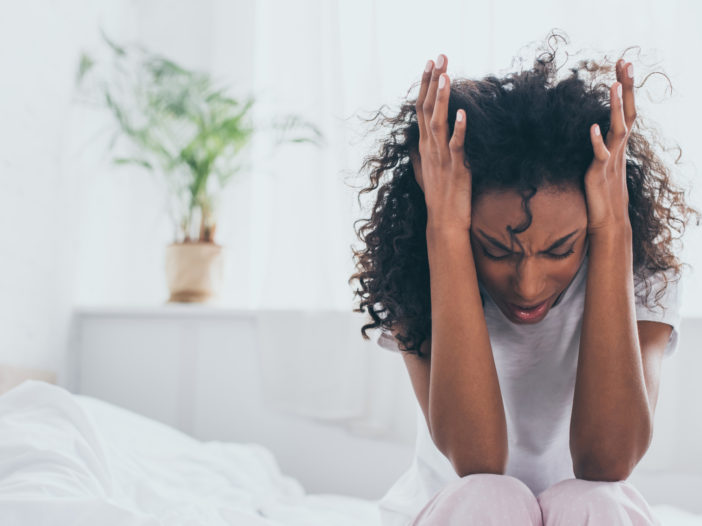
Migraine pain is more than just a severe headache. It is a complex condition with a wide variety of symptoms ranging from pain to disturbed vision. And migraines affect everyone differently.
The cause of migraines is still unknown. But experts believe that they stem from changes in the brain which affect how the nerves communicate, the balance of chemicals and the blood vessels. They may also be genetic and run in families.
And every migraine sufferer has a set of unique triggers.
These generally include one or a combination of the following:
- Emotions, such as stress, anxiety and excitement. There is a strong connection between stress and migraines. But it doesn’t just have to be stress. Any form of tension, whether it is anxiety or indeed excitement can bring on an attack for some people.
- Poor quality sleep. Too little, too much sleep or an irregular pattern can all be triggers.
- Inflammation in the body can impact the brain.
- Hormonal changes, such as menstruation, the perimenopause and the menopause.
- Certain foods such as gluten, alcohol, caffeine, chocolate, cheese, citrus fruits and foods containing tyramine (found in red wine and soft cheeses).
- Additives such as monosodium glutamate (processed and packaged food), nitrates (processed meats) and aspartame (sweetner).
- Dehydration
- Lack of food. Missing meals or eating sugary snacks instead of a balanced meal can also contribute to an attack.
- Nutrient deficiencies, such as vitamin D, magnesium, Vitamin B2, folate and coQ10
Tell me more about the migraine hormone link
Female hormones play a large part in migraines and this is why more women tend to get them than men. For menstruating women, the connection seems to be the drop in oestrogen which occurs a few days before their menstrual cycle begins.
If your migraines are linked to your menstrual cycle, you may find that they are less severe when you transition through the menopause.
But for others, during the perimenopause they become far worse. This is due to more erratic cycles and fluctuating levels of oestrogen. Some people during the peri years also start getting them for the first time.
For some women, taking HRT may make migraines worse. But for others, HRT can bring relief as it helps to regulate oestrogen levels.
Evidence also suggests that hormonal migraines may be linked to changes in the amount of serotonin in the brain. Serotonin modulates pain and mood. And it is impacted by oestrogen levels. Oestrogen has been linked to increased production of serotonin and preventing its breakdown. But when oestrogen levels drop, serotonin drops too, and this can cause a migraine attack.
For many people, some simple lifestyle changes can really help migraine pain
- Keep a food diary of what you eat so that you can identify and then avoid trigger foods.
- Focus on reducing stress, by introducing some relaxation into your life. Deep breathing and gentle yoga exercises may help. Or you may find that gardening and getting out for a walk is the tonic you need to relax.
- Set up a good solid nighttime routine. Switch off gadgets 2 hours before bed and keep the room dark and cool.
- Don’t allow your blood sugar levels to drop too much between meals. Make sure that you include quality protein and healthy fat in every meal to keep your blood sugar stable. A small healthy snack like a handful of nuts may also help.
- Include foods to help regulate your oestrogen levels. If you are suffering with high oestrogen levels (common in the early perimenopause years) include lots of cruciferous vegetables to help your body get rid of excess oestrogen. If levels are low, support with phytoestrogen foods which include flaxseeds, chickpeas and lentils.
- Reduce inflammation with a whole raft of anti-inflammatory foods. Think about fatty fish, turmeric, garlic and polyphenol fruits. For further inspiration, take a read here:
- And don’t forget to take out the pro inflammatory foods too (sugar, refined carbs, processed foods, alcohol and unhealthy fats)
- Make sure you are well hydrated with 6-8 glasses of water each day.
- Read food labels carefully and avoid additives
You may also want to do some tests to find out whether you have any nutrient deficiencies
Many people find symptoms ease when taking the following supplements:
Vitamin D
Vitamin D has a role in reducing inflammation and supporting nerve health. And so, a deficiency in this vitamin may increase migraines.
Magnesium
Many people find that taking a supplement reduces their migraine pain. Magnesium is found in foods such as leafy green veg, dried fruit, nuts and whole grains. And whilst it’s beneficial to increase these in your diet, you may need the additional support with a supplement.
Vitamin B6 as this is required to produce serotonin.
CoQ10 – has antioxidant properties which may help to stabilise imbalances and prevent migraines.
Please remember to seek advice before taking on a new supplement regime
Understanding the root cause of your migraines is an important first step. If you suspect that hormonal imbalances may be part of the problem, you may want to get them tested. Drop me a line to find out more.
nikki@greendenenutrition.com
